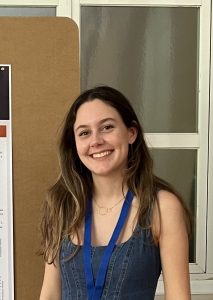This week we spoke to Amaya, current postgraduate co-president of the Women and Non-Binary in Physics Committee.
Describe your path into physics, what kickstarted it?
I grew up in Torrelavega, which is in a rural part of northern Spain. I was very lucky that my family and environment were always very supportive and encouraged me to explore many different interests. I was enrolled in our local music conservatory while in regular school and considered classical guitar and other creative roles as possible career paths. I was also good at maths and really enjoyed it. When we got to physics in high school, I found in it the same problem-solving and pattern-finding elements that I’d previously enjoyed in my music education. I also liked that I found it challenging — I felt struggling through problems only made the result more satisfying. I went on to do my undergrad degree in Physics with Theoretical Physics here at Imperial, which was a huge jump in difficulty, but I gained a strong foundation and exposure to a lot of different fields. I finally narrowed down my interests to quantum optics and quantum information once I completed my BSc project.
Congratulations on receiving the Stevenson Fund! What has been your experience of your research placement? What was the topic of your research?
Thank you! I really want more people to know about this. My research placement has been one of the greatest opportunities I’ve been able to access at Imperial and I would encourage everyone to consider applying for the Stevenson Fund if they’d like to expand their knowledge on a specific field of research.
In summary, this program financed all my expenses for a two-month placement at Columbia University in New York City, working in a theoretical quantum optics group. Their work was a long way away from anything I’d seen in lectures, so I spent a lot of time reading and reproducing results from books and papers. I got to learn about the statistical methods that are used to describe the evolution of quantum systems, which are hard to simulate classically due to the exponential scaling of the Hilbert space needed to capture them. I applied this to the study of collective effects in atomic arrays and how interference can suppress stimulated emission, which is useful, for example, in order to understand how to build efficient quantum memories.
My supervisor often hosted visitors to the department and she gave the group access to seminars at other institutions in New York as well, like the Flatiron Institute. This was a very valuable part of the placement as I was exposed to a wide variety of research topics in quantum physics, such as the latest results from the ALPHA collaboration on the experimental control and gravimetry of antihydrogen.
During your journey, what has your experience been being a woman in Physics? (Both good and bad!)
Back in school, it was definitely noticeable that girls felt they weren’t good enough for maths and physics — I ended up being the only girl doing Physics in our final year. I first became involved with WNBiP because I wanted to help change that. Some of the experiences I’ve had and witnessed in the department have definitely reminded me that we are a long way from equal opportunity and equal treatment, and that representation in academia is important to fix prejudice. However, I think the community we have formed in Blackett has been the most positive experience of my degree and I am really grateful for the conversations, comfort and opportunities that it has brought me.
What would be your advice for those beginning their Physics degree?
This sounds super cheesy and could mean a lot of things but make the most of it! My degree started out being online, so I was able to see in real time how much community and exposure to role models contribute to confidence, once we returned to the classroom and to social activities. Enjoy it, talk to people, watch out for events that interest you and seek out support if you need it — there are lots of great people in Blackett, Sherfield and the union working hard to make your experience better and they’ll be happy to help.
Finally, if you’re not feeling too confident: I promise even your friends who seem like they know everything don’t have it all figured out. The degree isn’t easy and it’ll really help your learning experience if you can identify and admit to gaps in your knowledge. I know I would like to be less defensive about what I don’t know — it’s something I’m still trying to get better at!